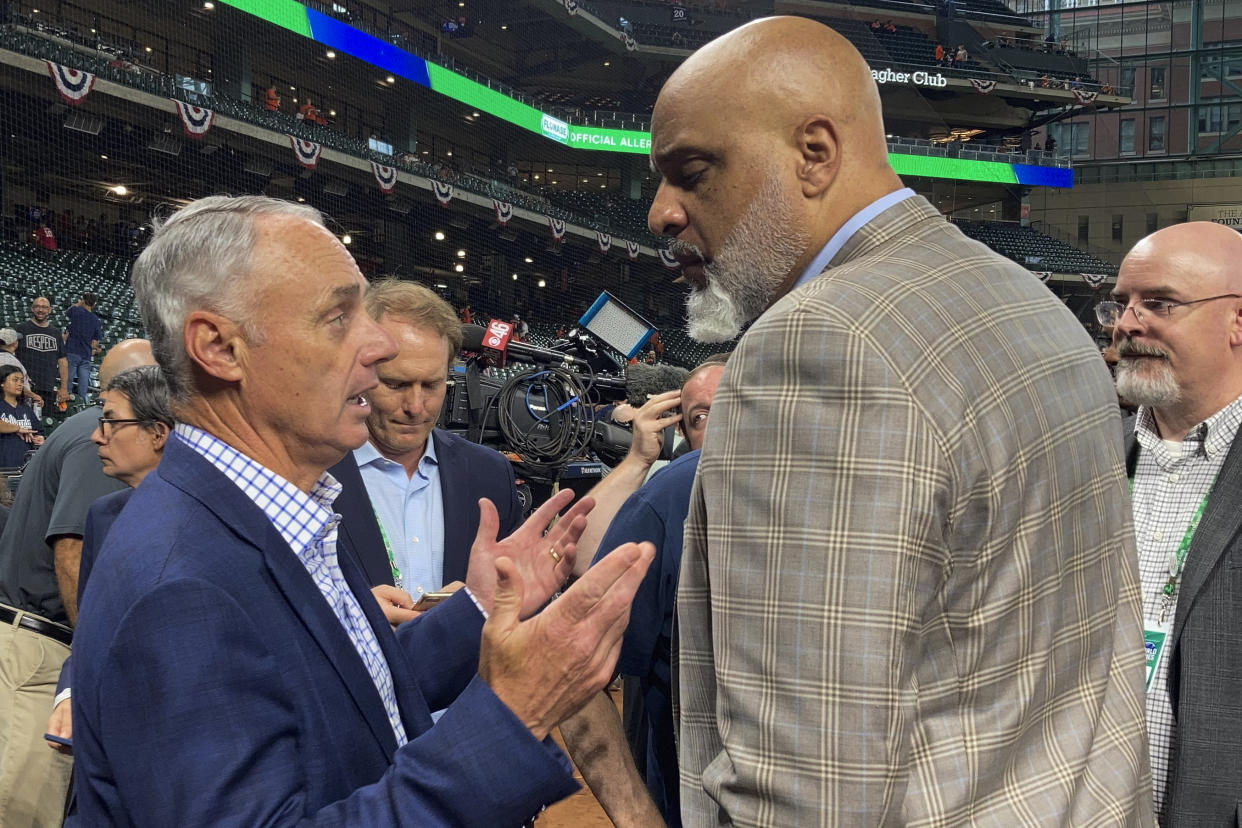Major League Baseball Players Association rejects league's international draft proposal
The Major League Baseball Players Association rejected MLB's last proposal for an international draft, cementing the current qualifying-offer system in place for the length of the collective-bargaining agreement.
Major League Baseball has long sought a draft for the international market and the union has historically — and successfully — resisted. The two sides agreed in March during CBA talks to table the topic of the draft and set a new deadline: July 25. If they had reached an agreement on an international draft, the existing qualifying-offer system — which attaches draft picks to certain free agents and which the union believes suppresses the free agent market — would have been eliminated. Now, the QO system will remain in place and international amateurs will continue to enter affiliated baseball via free agency, instead of a draft.
A draft provides control and cost certainty to teams, and so naturally the Players Association prefers an open market. The issue is made vastly more complex by the rampant and widely recognized corruption in Latin America, particularly in the baseball hotbed that is the Dominican Republic. MLB contends that a draft would curtail corruption by making it less advantageous for teams to skirt the rules. The players recognized that the current system is flawed, but have been wary of signing on to anything that doesn’t offer clear and sufficient improvements.
It remains possible the two sides will work with each other in other ways to try to limit corruption in Latin America.

International players can sign at 16 years old, but often strike unofficial handshake deals with teams several years before that. After a new CBA, agreed to in 2017, hard capped international signing pools, these early deals became more common and more problematic. Teams looking to lock up talent and with the leverage of their limited bonus pool money will reach verbal agreements with kids in their early teens, years before they can officially sign. Trainers and teens are incentivized to abuse performance-enhancing drugs to secure an early deal, or to attract a team’s attention if they remain unsigned at 16. A hefty portion of a player’s promised bonus is funneled to so-called buscónes to fund years of unregulated training and development. And if the team spends their bonus money elsewhere and ultimately reneges on their promise to sign a player for a certain amount, there’s little recourse.
A draft would remove the incentive to strike early deals with kids as young as 12, and thus theoretically clean up some of the established under-the-table practices.
Earlier this month, the union made a proposal to the league that included an international draft for the first time. Like the league’s earlier proposal during the CBA negotiations, it was for 20 rounds. Other similarities include an education component, leagues in the Dominican Republic and Venezuela, and international tryouts. The league had previously proposed $181 million in a hard-slot bonus pool money and the union countered with a $260 million system that could expand from there and includes what amounts to financial guardrails against a decline in players being scouted and signed out of Latin American countries. (The degradation of baseball in Puerto Rico when it was folded into the Rule 4 Draft in the 1990s is often cited as a cautionary tale.)
Both sides exchanged proposals again over the weekend. The union’s latest offer kept the $260 million bonus pool, while the league increased to $191 million in what was called its last proposal.
"Our draft proposals — unprecedented in MLBPA history — sought to establish minimum guarantees in player signings, roster spots, infrastructure investments, playing opportunities, scouting opportunities, as well as enforcement measures to combat corruption," the MLBPA said in a statement. "We also made proposals to compensate international signees more fairly and in line with other amateurs, and to ensure that all prospects have access to an educational and player development safety net.
"At their core, each of our proposals was focused on protecting against the scenario that all players fear the most — the erosion of our game on the world stage, with international players becoming the latest victim in baseball’s prioritization of efficiency over fundamental fairness. The league’s responses fell well short of anything Players could consider a fair deal."
Statement on Players’ rejection of MLB’s international draft proposal pic.twitter.com/wAlIZcS4bt
— MLBPA Communications (@MLBPA_News) July 25, 2022
MLB said it had hoped to "address longstanding challenges and benefit future players" with its draft proposal.
"We are disappointed the MLBPA chose the status quo over transitioning to an international draft that would have guaranteed future international players larger signing bonuses and better educational opportunities, while enhancing transparency to best address the root causes of corruption in the current system,” the league said in its statement.
International acquisitions and the free-agent market will continue on, unchanged. But in a league increasingly headlined by international stars — they made up 28% of opening day rosters and 35% of All-Star selections — the issue of an international draft isn’t going away, it’s just getting pushed down the road, again.
